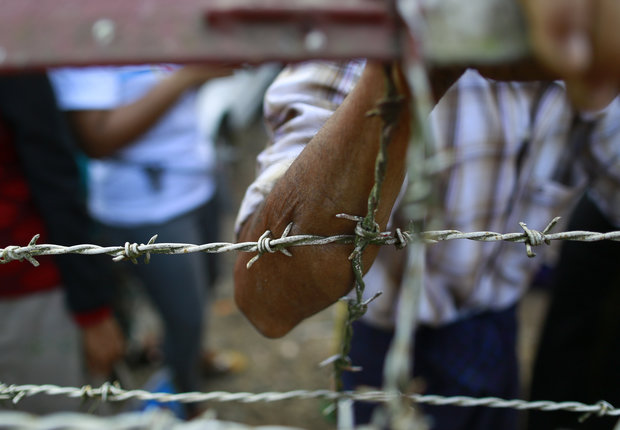Twelve Muslim men were sentenced on Monday in Mandalay to five years imprisonment for alleged links to an armed organisation called ‘Myanmar Muslim Army’ — the existence of which has been called into doubt by several observers.
The trial has been heavily criticised by human rights watchdog Fortify Rights, which has closely monitored the proceedings.
In a statement released on Sunday, one day before the verdict, Fortify Rights asserted that “the Myanmar government denied a fair trial” to the defendants and that “the Myanmar authorities allegedly tortured” them to extract incriminating confessions.
“The government failed to provide evidence to support its case against these individuals. When pressed on the lack of evidence by defence lawyers, government witnesses invoked the 1923 Official Secrets Act to justify withholding evidence, or simply stated that they received information ‘from above’”, said Matthew Bugher, a lawyer from Harvard University and consultant to Fortify Rights who has monitored three of the hearings.
[pullquote]”The law under which these individuals were convicted is problematic in and of itself.” [/pullquote]
The defendants were sentenced under Section 5 (J) of the 1950 Emergency Provisions Act, a law routinely used to arrest pro-democracy activists during the worst years of the military dictatorship and carried a maximum sentence of seven years in jail.
“The law under which these individuals were convicted is problematic in and of itself. In the past, the vague provisions of this law have been used to lock up pro-democracy activists in sham trials. The use of this law as the country is seeking reconciliation on a number of fronts in really shocking,” said Mr Bugher.
The case was first uncovered in an investigation carried out by Veronica Pedrosa and the author of these lines, published by The Intercept in May this year. Most of the accused are from Mandalay, while the others are from Shan, Mon and Karen states. All of them were arrested in Mandalay in late November 2014. The youngest detainee is only 19 years old, and the oldest 58.
Soe Moe Aung, 24, is among the youngest defendants. He was arrested on 17 November last year, when several policemen entered his family’s home in Mandalay at night. His mother, Daw Nwe Ni Aung, told The Intercept earlier this year that nobody showed them an arrest warrant, and neither she nor a lawyer were able to visit her son for 10 days after his arrest.
[pullquote]“He’s sick — he suffers from gout — so how could he have received any training?” [/pullquote]
“They accuse him of undergoing training in a camp, but I don’t think that’s possible. He’s sick — he suffers from gout — so how could he have received any training?” Daw Nwe Ni Aung said.
Nandar Myint Thein, the lawyer of Soe Moe Aung and four other defendants, told The Intercept at that time that her clients were forced to sign their confessions after enduring days of torture in custody without having access to any lawyer for several days.
Mr Bugher echoes these allegations: “I heard a defendant alleging in court that he was tortured during interrogation and forced to sign a document he was not allowed to read. We have reason to believe that other defendants may also have been tortured. The allegations of torture seriously undermine the credibility of the trial. The court failed to deal with these allegations in any meaningful way,” he told DVB.
According to one of the court documents seen by The Intercept and DVB, “the accused have received training in Myanmar Muslim Army camps, which has been launched and is operating illegally.” None of these documents contain evidence about the existence of such organisation or information about the locations of the mentioned camps.
“When I asked the prosecution’s witnesses for evidence about the Myanmar Muslim Army, they answered that they couldn’t speak about it before the court, that this information came from above,” Nanda Myint Thein told The Intercept.
The director of the President’s Office, Zaw Htay, defended the government’s position during the investigation in an interview with The Intercept. “The Home Affairs ministry has all the evidence on these activities, but we can’t make it public because this is a national security issue,” he said.
He also refused to say how many people the government believes to be members of the ‘Myanmar Muslim Army’, but claimed that “there are many activities outside the country and they want to promote their terrorist attacks with some people inside the country, so right now we are doing a preemptive strike to protect ourselves against any possible attack.”
The trial and the verdict are taking place in the context of an upsurge of anti-Muslim sentiment among the Buddhist majority in Burma – which has at times exploded in waves of sectarian violence in Arakan State and central Burma. The latest episode of violence in central Burma between Buddhists and Muslims took place in July 2014 in Mandalay, and claimed the lives of one Buddhist and one Muslim man.
[related]
“It’s immensely worrying that the government is asserting a Muslim militant group appeared out of thin air, and then provided basically no information on who this group is nor any evidence that the 12 convicted men had anything to do with it,” said Phil Robertson, the deputy director of Human Rights Watch in Asia.
“What this outcome says to already concerned Burmese Muslims is they cannot expect a free and fair trial in the courts – thereby undermining the rule of law which is basically the only thing that can effectively constrain growing communal tensions between Burmese Buddhists and Muslims. These men need to be released pending a complete and total retrial of this case,” he added.



